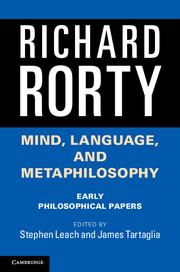Book contents
- Frontmatter
- Contents
- Foreword
- Acknowledgments
- Introduction
- 1 Pragmatism, categories, and language
- 2 The limits of reductionism
- 3 Realism, categories, and the “linguistic turn”
- 4 The subjectivist principle and the linguistic turn
- 5 Empiricism, extensionalism, and reductionism
- 6 Mind-body identity, privacy, and categories
- 7 Do analysts and metaphysicians disagree?
- 8 Incorrigibility as the mark of the mental
- 9 Wittgenstein, privileged access, and incommunicability
- 10 In defense of eliminative materialism
- 11 Cartesian epistemology and changes in ontology
- 12 Strawson’s objectivity argument
- 13 Verificationism and transcendental arguments
- 14 Indeterminacy of translation and of truth
- 15 Dennett on awareness
- 16 Functionalism, machines, and incorrigibility
- Index of names
- References
16 - Functionalism, machines, and incorrigibility
Published online by Cambridge University Press: 05 June 2014
- Frontmatter
- Contents
- Foreword
- Acknowledgments
- Introduction
- 1 Pragmatism, categories, and language
- 2 The limits of reductionism
- 3 Realism, categories, and the “linguistic turn”
- 4 The subjectivist principle and the linguistic turn
- 5 Empiricism, extensionalism, and reductionism
- 6 Mind-body identity, privacy, and categories
- 7 Do analysts and metaphysicians disagree?
- 8 Incorrigibility as the mark of the mental
- 9 Wittgenstein, privileged access, and incommunicability
- 10 In defense of eliminative materialism
- 11 Cartesian epistemology and changes in ontology
- 12 Strawson’s objectivity argument
- 13 Verificationism and transcendental arguments
- 14 Indeterminacy of translation and of truth
- 15 Dennett on awareness
- 16 Functionalism, machines, and incorrigibility
- Index of names
- References
Summary
In a well-known paper published in 1960, Hilary Putnam put forward an analogy between the logical states of Turing machines and the mental states of human beings, and offered an explanation of how the “privacy” of the mental could be matched in a machine.* In subsequent papers by Putnam and various other philosophers, the notion that mental states are functional states has been taken as a new alternative to traditional theories of mind (dualism, behaviorism, materialism, etc.). I shall argue that the notion of “functional state” cannot help to clarify that of “mental state” unless something like Putnam’s interpretation of the “privacy” of states of a machine can be accepted, and I shall go on to claim that nothing like this interpretation is going to work. I think, however, that the point Putnam makes in his 1961 paper against traditional “theories of mind” is sound and important, and can be clarified by being disentangled from talk of “functionalism.”
It is hard to find in the recent literature an exact characterization of what a “functional” state is. We may, however, begin with Jerry Fodor, who says that common-sense psychological theories that do not pry into physiological mechanisms postulate inner states (beliefs, desires, etc.) which purport to account for behavior, and that “the characterization of these states is purely functional since we know about them only what role they play in the production of behavior.” Such states sound much like old-fashioned Rylean dispositions to behave, but presumably the difference is that Rylean behaviorists dreamed of an explicit definition of “the belief that p” in terms of movements of the body, sounds emitted, etc., whereas functionalists recognize that implicit definition must replace explicit and that reference to other inner states (desires, other beliefs, etc.) must enter into an explanation of what such phrases mean.
- Type
- Chapter
- Information
- Mind, Language, and MetaphilosophyEarly Philosophical Papers, pp. 299 - 315Publisher: Cambridge University PressPrint publication year: 2014
References
- 2
- Cited by



